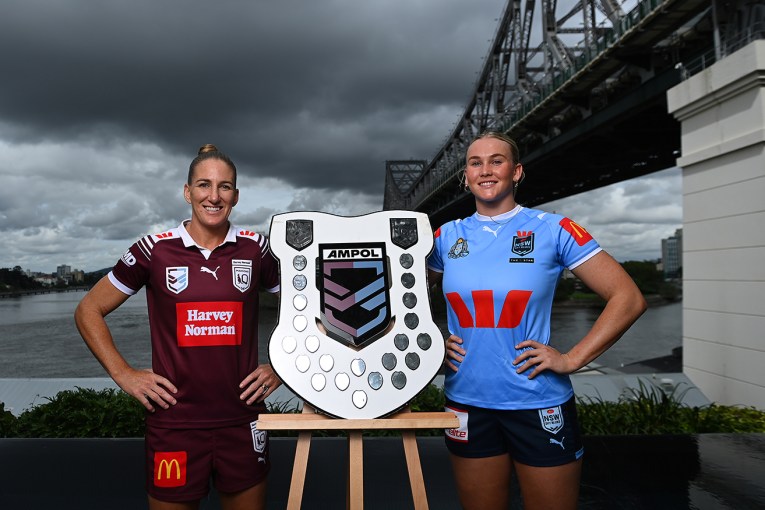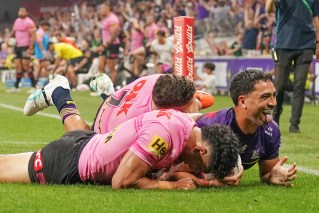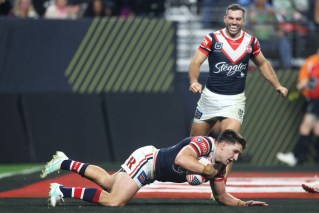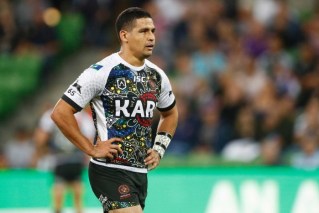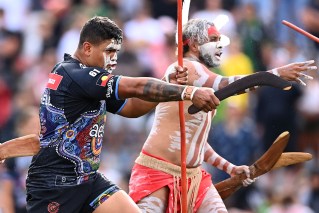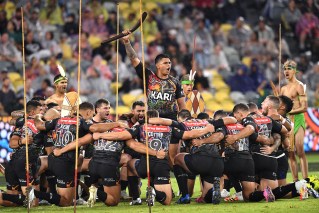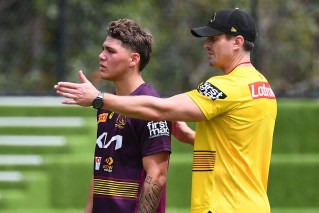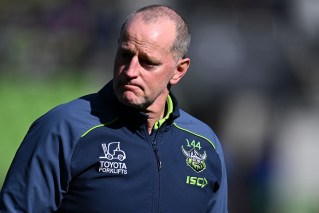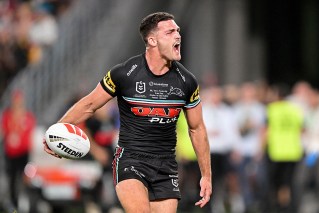Why it’s time to embrace the Kangaroos

Hardly a positive word has been spoken about this Friday’s trans-Tasman Test showdown in the wake of the barely recognisable squad New Zealand has named to take on the settled World Cup-winning Australians.
If you were to believe the vast majority of cynical media types, the battle for the Bill Kelly Cup is a waste of time, a farce, an insult to international game, and even an affront to Anzac tradition.
But it is still a Test match – and an intriguing one at that. There are 17 enthusiastic and passionate Kiwis ready to take the fight to the dominant world champs and make the pundits choke on their derogatory statements, which have done the limited gamut of Test rugby league no favours.
The New Zealand side named has been dubbed the worst ever in some quarters; a quick scan over some line-ups that trotted out during the 1980s and ’90s reveals the hyperbole in that statement, but it is an undeniably weak squad in an era of unprecedented Kiwi depth and quality.

Jared Waerea-Hargreaves was a shock omission for the Kiwis. Photo: Getty
An astronomical injury toll has claimed virtually their entire five-eighth and hooker stocks – Kieran Foran, Issac Luke, Thomas Leuluai and Josh Hoffman – while Elijah Taylor (another rare dummy-half option), Frank Pritchard, Jeremy Smith and Manu Vatuvei are also sidelined.
The Kiwis can’t be blamed for their bulging casualty ward, but the source of controversy and subsequent ridiculing of the Test came after coach Stephen Kearney left out international mainstays and NRL stars Jared Waerea-Hargreaves, Frank-Paul Nuuausala, Shaun Kenny-Dowall, Ben Matulino and Alex Glenn.
Do supporters of New Zealand’s All Blacks – the rugby union equivalent of the Kangaroos on the score of results and dominance – bemoan their heroes’ continued world supremacy? Not at all, they revel in it.
Kearney threw out the buzzwords ‘form’ and ‘future’ to explain the shock omissions, while refusing to elaborate further. Glenn and Kenny-Dowall have been in great touch, however, and the others have been average at worst.
But the exclusion of Waerea-Hargreaves has attracted the most conjecture. Regarded among the top echelon of NRL props, he would have provided the Kiwi side with much-needed presence and confidence. Although statistics have revealed his recent Test performances have been ordinary, the 25-year-old shaped as the New Zealand forward pack anchor for the next five years.
The six survivors from the Kiwis’ World Cup final squad have been joined by six Test debutants – Peta Hiku, Martin Taupau, Ben Henry, Isaac John, Siliva Havili and 18th man Kenny Bromwich – who boast a grand total of 132 NRL games’ experience.
Penrith back-up half John and Warriors hooker/backrower Havili, who has incredibly played just three NRL games as an interchange, are the biggest bolters – but they were virtually the only spine options remaining. Warriors utility Henry will start in the No.9 despite not playing hooker at any level previously, with Havili to provide dummy-half cover off the bench.
Mercilessly criticised for stumbling against the Kiwis in tournament finals in 2005, 2008 and 2010, the Kangaroos have emphatically reclaimed the ‘world’s best’ tag.
There is little doubt the criticism of Kearney and the Kiwis brains trust has been exacerbated by the injury toll leaving the side vastly short on experience, but by the same token the enforced absence of Foran, Luke and co should perhaps have prompted Kearney to refrain from making a statement by leaving out other big names.
A positive aspect of Kearney’s team, besides the outstanding form of every player picked, is that – with the exception of Henry – he has picked specialists rather than pitching ‘name’ players into unfamiliar positions. The Kiwis were regularly brought undone during the mid-2000s by selecting the likes of centre stars Jerome Ropati and Nigel Vagana in the key fullback and five-eighth roles.
And as for the Australian side, their overwhelming dominance should be celebrated, not admonished. The retention of 13 members of the 17-man squad that featured in the Kangaroos’ 34-2 World Cup final demolition of the Kiwis is a reflection of the special group of players Australia is currently blessed with – surely one of the halcyon eras of the nation’s Rugby League history on the Test stage. Yet the Australian media, former players and even supporters see it as a negative.

Young Brisbane Bronco Matt Gillett is ready to debut for the Kangaroos. Photo: Getty
Do supporters of New Zealand’s All Blacks – the rugby union equivalent of the Kangaroos on the score of results and dominance – bemoan their heroes’ continued world supremacy? Not at all, they revel in it.
Australia’s performance in the Old Trafford final was one of the most complete in the code’s history. Friday represents an opportunity for the press and the public to show due gratitude to the national side.
Whatever the outcome, rejoice in the Kangaroos’ brilliance or the Kiwis’ pluck – leave the pessimism behind in a week where representative rugby league has taken a callous beating in public sphere.
Mercilessly criticised for stumbling against the Kiwis in tournament finals in 2005, 2008 and 2010, the Kangaroos have emphatically reclaimed the ‘world’s best’ tag. If they win as expected this week, they will equal the all-time record the Australian side set from 1979-83 of 16 consecutive Test wins. So how about some credit for their efforts, rather than belittling their opposition?
The debut of dynamic Brisbane backrower Matt Gillett is another reason this Test matters – rising to the highest level is what rugby league, and sport in general, is all about. Coach Tim Sheens and the Australian selectors have also shown there is no room for complacency by axing incumbent bench forwards Andrew Fifita and Josh Papalii in favour of Nate Myles and Boyd Cordner.
The pressure on the Kangaroos’ superstar-laden line-up will be palpable as kick-off looms. Given the condemnation heaped on the New Zealand side, an Australian loss would be unpalatable – and they’re not playing a team of mugs by any stretch. Individually, the likes of Cooper Cronk and Billy Slater would struggle to hold onto their spots for the end-of-year Four Nations if the Kangaroos were to go down, with Daly Cherry-Evans and Greg Inglis now recognised as the best halfback and fullback in the game respectively.
A landslide victory to Australia is admittedly the most likely outcome – but that would by no means be an anomaly in trans-Tasman competition. Meanwhile, the green Kiwis outfit will not be short on enthusiasm, and possess the game-breakers in the shape of Shaun Johnson and Roger Tuivasa-Sheck to punish the Kangaroos if they turn up sluggish. New Zealand’s rugged pack will be eager to stand up to their vaunted Australian counterparts after being battered into submission in the World Cup final.
Whatever the outcome, rejoice in the Kangaroos’ brilliance or the Kiwis’ pluck – leave the pessimism behind in a week where representative rugby league has taken a callous beating in public sphere.
Five reasons Australia can’t be complacent
1983 – New Zealand 19 def Australia 12 at Lang Park, Brisbane
Beaten 16-4 in the first Test in Auckland, the Kiwis recorded one of their most famous victories in the return clash. The Graham Lowe-coached side unsettled Australia with strong-arm tactics, while brilliant tries to James Leuluai and Joe Ropati secured the emphatic win. It was New Zealand’s first success over the green-and-golds in 12 years, while it ended Australia’s world record run of 16 Test wins. The Kiwis fielded debutant Nicky Wright at fullback and four players making just their second international appearance.
1985 – New Zealand 18 def Australia 0 at Carlaw Park, Auckland
Australia won the opening two Tests via last-minute tries to winger John Ribot, before coach Terry Fearnley infamously dropped a handful of Queensland stars from the team for the dead-rubber in Auckland. But the move backfired as the Kiwis scored a stunning 18-0 shutout. Halfback Clayton Friend scored two tries, while man-of-the-series Olsen Filipaina – plucked from North Sydney’s reserve grade side – outplayed the great Wally Lewis for the third straight match as Australia was held scoreless for the first time since 1956.
1987 – New Zealand 13 def Australia 6 at Lang Park, Brisbane
Lang Park proved a happy hunting ground for the Kiwis once again, pulling off a courageous win over an Australian side containing luminaries such as Lewis, Sterling, Kenny, O’Connor, Jack, Miles and Pearce. The Kangaroos had gone through Britain and France unbeaten the previous season, but reputations mattered little to a Kiwis side coached by unheralded Tony ‘Tank’ Gordon and containing five players who only made their Test debuts a month earlier against Papua New Guinea.
1991 – New Zealand 24 def Australia 8 at Princes Park, Melbourne
After being dominated by the Kangaroos for three seasons, the Kiwis pulled off one of the great modern upsets in front of a bumper Melbourne crowd in the opening Test of the ’91 series. Jarrod McCracken and Richie Blackmore were among the five players in their first year of Test service to star in the resounding victory over a powerful Australian line-up, while captain Gary Freeman was playing reserve grade for Balmain and Clayton Friend was selected from the relative obscurity of the now-defunct Metropolitan Cup. Australia’s embarrassing defeat heralded the end of Wally Lewis’ decorated Test career.
1998 – New Zealand 22 def Australia 16 at North Harbour Stadium, Auckland
Australia fielded its first all-inclusive Test side since 1994 after three years of Super League conflict, but New Zealand stole the show in an outrageous upset. The Kangaroos stormed to an early 12-2 lead, but with young fullback Darren Lockyer experiencing a notorious debut, the Kiwis rallied spectacularly to snare their first win over an official Australian Test team in six years. Veteran centre Kevin Iro came off the bench to score two vital tries in what remains New Zealand’s last mid-season Test victory against Australia.
